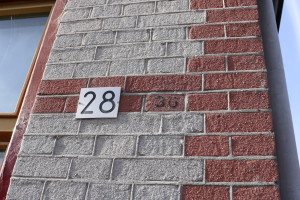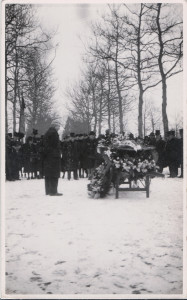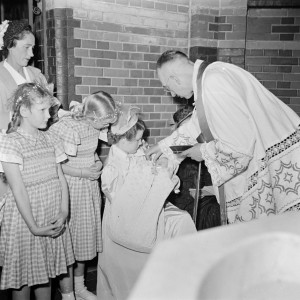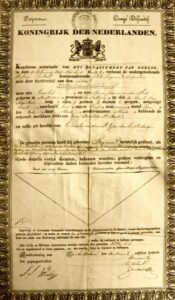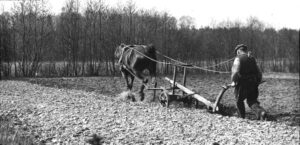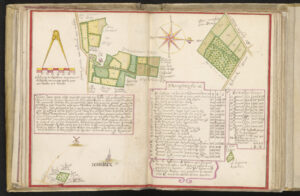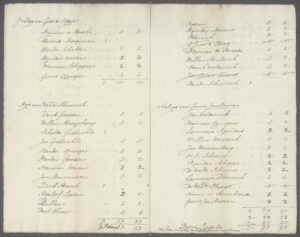Omnummeren means to renumber. In the past, addresses often changed from one census/population register to the next. The houses would be omgenummerd; renumbered. This can make it difficult to find the modern locations of historical addresses. See tips for finding the address where your ancestors lived for some ideas. Some archives have omnummerlijsten (renumber lists) or omnummerregisters (renumber registers), either created in the past and part of their records, or created in the modern … [Read more...]
Dutch term – Boomgaard
A boomgaard is an orchard. In older records, you may see the word spelled as boomgaerd, bogaerd, or even bongerd. You may come across the term in land records. Some last names are derived from the word boomgaard: Van den Bogaerd, Van den Bogert, and even the Latinized Bogardus all mean "from the orchard." … [Read more...]
Dutch term – Gaarder
A gaarder is a collector, typically of taxes or tariffs. You may come across the term doing research in the province of Holland between 1695 and 1806, when a special tax ("impost") was levied on marriages and burials. The duties that had to be paid depended on the economic circumstances of the bridal couple or the deceased. The records of those taxes are known as the gaarderboeken [collectors' books]. These records can be used as substitutes for marriage and burial records. The actual … [Read more...]
Dutch term – Stamboek
A stamboek is a military service register. Outside genealogy, the word stamboek is also used for a studbook, a register of the pedigree of purebred animals. This usage has led several genealogy websites, including Ancestry, to mistranslate the stamboek military records as "studbooks." … [Read more...]
Dutch term – Lijkschouwing
Lijkschouwing literally means corpse-assessment. It is the term for the assesment by a doctor after a person died, to determine whether the person died of natural known causes, natural unknown causes, or unnatural causes. This is typically done by the doctor treating the patient or the doctor who was on call when the patient died. If unnatural causes are suspected, the doctor will inform the municipal coroner and an autopsy is usually performed. This is how it is under the current law (1991). … [Read more...]
Dutch term – Common Abbreviations in Dutch Genealogies
Here is a list of abbreviations you may find in published genealogies in the Netherlands. Abbreviation Full version Translation geb. geboren born ged. gedoopt baptized overl. overleden died begr. begraven buried tr. trouwt marries ondertr. ondertrouwt marriage banns ca. circa circa waarsch. waarschijnlijk probably zn. van zoon van son of dr. van dochter van daughter of wed. van weduwe van widow … [Read more...]
Dutch term – Gepasporteerd
Gepasporteerd (literally: passported) means a passport was issued. You will typically come across the term in military service records in the 1800s. At the end of service, a soldier received a passport to show he fulfilled his military duties. Since these passports were given to the soldiers, they may have survived in private collections but are unlikely to turn up in archives. See the reader question about military passports in the 1800s for an example. … [Read more...]
Dutch term – Ploeg, ploegen
A ploeg (plural: ploegen) is a plow. Ploegen is also the verb "to plow." Plowing was typically done in the spring. You may come across the noun in estate inventories of farmers. … [Read more...]
Dutch term – Belending
Belending means abutting or adjoining. You may come across the term in notarial or court records involving properties. The belendende percelen are the abutting properties, that share a property boundary with the property that is being discussed. Many Dutch land records before the introduction of the Cadaster in 1832 identify the location of properties in terms of its neighbors, sometimes with cardinal directions, but often just in terms of "in between the houses of so-and-so." Sometimes, the … [Read more...]
Dutch term – Inkwartiering
Inkwartiering means billeting, when soldiers were quartered in civilian houses. This could happen during times of occupation. Town records may have lists of houses where soldiers were billeted, including compensation for expenses. Knowing your ancestors had soldiers billeted at their house can be useful in different ways. Apart from being an interesting piece of biographical information, it places your ancestor in a specific time and place, which can help to determine when they died or moved, … [Read more...]
